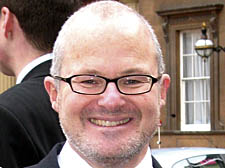|
|
 |
| |

Jack Morris OBE |
‘From affluent streets to children in poverty, we are a divided borough’
New charity says education and employment for all are key to uniting the ‘two Islingtons’
INFLUENTIAL philanthropist Jack Morris – co founder of the Business Design Centre – called on Islington’s “comfortably off” to remember the borough’s most disadvantaged when he spoke at an event on Monday night.
Mr Morris, OBE, was at the launch of a new charitable campaign, Islington Giving, organised by the Cripplegate Foundation and held at the historic St Giles’ Church in the Barbican.
More than 150 guests who attended heard that 500 years after Cripplegate was founded Islington is still the eighth most deprived borough in the UK, has more than 40 per cent of children living in poverty, has the highest suicide rate in the UK, and yet manages to contain some of the wealthiest people in the country.
Mr Morris, 53, the youngest of five children born on the Woodberry Down estate at Finsbury Park, described education and employment as being at the forefront of his the family’s charitable Morris Trust, launched in 1989.
He added: “We’ve always been aware of the two Islingtons. One is very successful and affluent and the other suffers from great social disadvantage.
“The aim of Islington Giving will be to bring all local charities together for the benefit of the borough’s less well off.”
The Morris charity has already supported various Islington school projects, community gardens, creche and play centres as well as supporting smaller charities.
Mr Morris said: “We’ve been based in Islington a long time and felt we should put something back in the community. We’re particularly concerned about the welfare of the young. They need to get all the training and work opportunities that are available.”
Mr Morris, who went to state schools added: “Education is the key to employment. But encouraging young people to train for skills after school is also important.”
He listed his close knit family as among his greatest inspirations.
Islington mayor Anna Berent and council leader Councillor Terry Stacy were among invited guests.
Cripplegate, launched originally in the year 1500, has an endowment of £25million and gives away £1.7million a year to Islington charitable causes, including recently to a new welfare rights service in Finsbury Park and Essex Road, and youth groups.
The charity’s chief executive, Kristina Glenn, said: “Cripplegate was launched at St Giles Church in the City – where Oliver Cromwell married – when someone gave them £14, which was the equivalent of £200,000 in today’s money. “In those early days donating was believed to be the best way of going straight to heaven.”
Ms Glenn said Islington Giving was all about people in the community getting together to support each other.
“The message is everyone can give something to help the disadvantaged in Islington,” said Ms Glenn. “It could be volunteering time or giving money”.
The evening’s welcome was made by Vice chairman of Cripplegate David Sulkin, chief executive of the Musicians Benevolent Fund. Those who performed included The London Sinfonietta Collective, the Elizabeth Garrett Anderson College Gospel choir and Connecting vibes, who performed a Gum Boot Dance.
Survey to ‘shine a torch on poverty’
A WIDE-RANGING survey of life in Islington was commissioned by the Cripplegate Foundation to “shine a torch on the poverty” in the borough.
The reasons why “ill health, debt, isolation and lack of opportunity” are so “entrenched” in the borough are explored in a 54 page report – titled Invisible Islington – published by the Foundation on Monday.
Researchers interviewed 29 people over a six-month period and found that:
? DEBT – Half were in debt, with debts ranging from a few hundred pounds to thousands.
? SAVINGS – None, apart from older women, had any savings.
? CREDIT – Though credit was widely available, no one knew where to go for financial advice.
Only one woman of the 29 interviewed was working. Lack of childcare, poor English and lack of “decent jobs” were the main reasons given.
Most of the 29 did not have a “role model” in their lives representing opportunity, aspiration or success. Their friends, family and acquaintances were in the same situation.
Many suffered from health problems – the reason given for being unhappy.
Many had long-term or terminal conditions.
The report shows how in Canonbury the “breadline” poor rose from 30 per cent in 1980 to 49 per cent in 2000; the “asset” wealthy grew from 1 per cent in 1980 to 20 per cent in 2000.
In Holloway, the proportion of the poor rose from 31 per cent in 1980 to 48 per cent in 2000; asset wealthy grew from 2 per cent in 1980 to 19 per cent in 2000.
The report points out that after a successful door-knocking project, more than 700 people were shown how they could get help from local services.
The Cripplegate Foundation also pledged that it would work with the Islington Primary Care Trust and other bodies to provide more advice and support for people suffering from ill health. |
 |
|
|
 |
| |
| |
|
 |
|